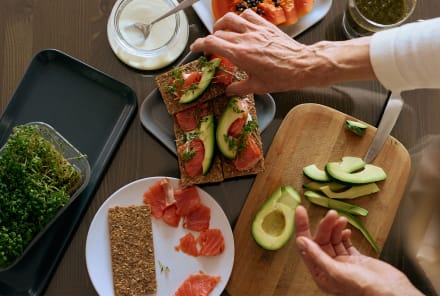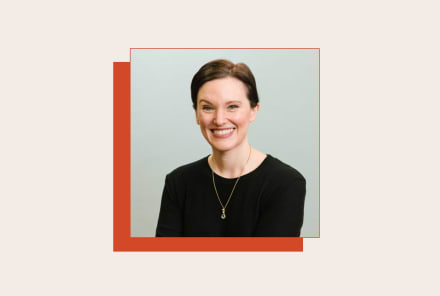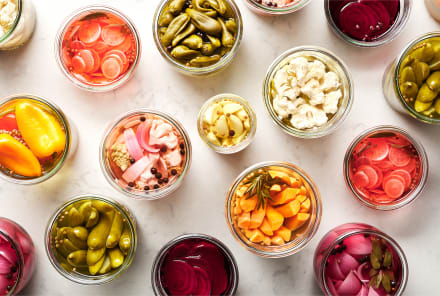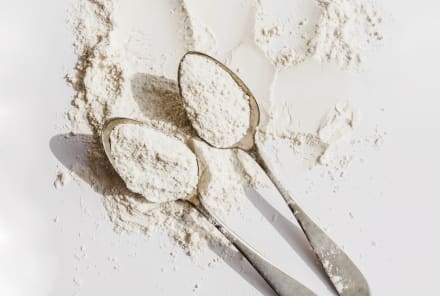Advertisement
Why "Comfort Foods" May Be Discomforting For Your Brain, From A Nutritional Psychiatrist

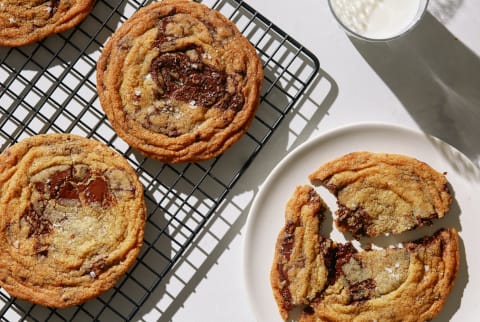
Are your favorite "comfort foods" actually creating discomfort for your mental well-being?
When we feel anxious, stressed, or worried (hello, pandemic), it can be hard to stay away from highly processed, sugary foods. Our tendency as human beings is to look for a quick fix, something to distract or hide ourselves from those difficult emotions.
While there's nothing wrong with enjoying a cookie at times, reaching for a baked good or processed snacks when you're hungry for comfort might actually making negative feelings worse.
Why comfort food can do more harm than good.
As a nutritional psychiatrist, I've seen time and time again how excess added sugars, artificial sweeteners, fried foods, and processed foods can dull mood and drive anxiety. There is strong evidence that a poor diet, and higher sugar intake, is associated with mental health issues.
Think of it as a domino effect. You feel sad and you eat a cookie. It's a food high in simple carbohydrates and it increases insulin levels and allows more tryptophan (the natural amino acid building block for serotonin) to enter the brain, where it is converted to serotonin. The calming effect of serotonin can take effect in 20 minutes or less by eating these foods—so you do feel good! Because of that good feeling, you may reach for another cookie. And the cycle repeats.
The blood sugar roller coaster can lead to inflammation in the body1, which then creates inflammation in the brain and may lead to fatigue, anxiety, and even depression.
How to avoid the negative effects of "comfort food."
If you want to avoid a blood sugar and emotional roller coaster, I suggest limiting highly processed foods and instead boosting your mood with healthy, whole, and truly comforting foods. Some of my favorites include dark chocolate, roasted chickpeas, golden latte, mixed berries, nice cream made from frozen bananas and cacao powder, kale chips, homemade granola, or my favorite brain-supporting chocolate-hazelnut spread (check out my recipe, below!).
All of these are mood-boosting foods, rich in vitamins, minerals, and antioxidants that can help comfort your brain and body.
Mood-Boosting Chocolate Hazelnut Spread Recipe
Makes: 1 jar
Ingredients
- 2 cups peeled and roasted hazelnuts
- ½ cup extra dark chocolate (more than 80% dark)
- 2 tablespoons Manuka honey
- 1 tablespoon of cacao powder (adjust for your preference. I like it dark and very chocolaty!)
- ¼ teaspoon instant espresso powder (which elevates the chocolate flavor)
- 1 teaspoon vanilla extract (I like Madagascar vanilla, like Ina Garten!)
- 1 tablespoon coconut oil (optional)
Method
- Toast the raw hazelnuts in a 360°F oven for 10 minutes, and watch closely so they don't burn. Remove and allow nuts to cool.
- Put the chocolate in a bowl, and set the bowl over a pot of boiling water, gently stirring until it melts.
- Place the cooled hazelnuts in a food processor, and blend to a textured paste.
- Add the melted chocolate, honey, cacao powder, espresso powder, and vanilla, and blend until the mixture becomes a creamy paste. If the mixture appears dry, add in a tablespoon of coconut oil and blend.
- Place in a clean Mason jar for storage. And voilà, a sweet mood-boosting spread!

Dr. Uma Naidoo is a Harvard-trained nutritional psychiatrist, nutritional biologist, professional chef, and author of the upcoming title, Calm Your Mind With Food, which is now available for preorder, as well as the international bestseller, This Is Your Brain on Food (An Indispensible Guide to the Surprising Foods that Fight Depression, Anxiety, PTSD, OCD, ADHD, and More).
She is currently the Founder and Director of Nutritional and Lifestyle Psychiatry at Massachusetts General Hospital (MGH), the first US clinic of its kind where she consults on nutritional interventions for the psychiatrically and medically ill. Naidoo is also a culinary instructor at The Cambridge School of Culinary Arts. She writes for Harvard Health and Psychology Today. She just completed her most recent project which is a unique video cooking series for the MGH Academy that teaches nutritional psychiatry using culinary techniques in the kitchen.
More from the author:
Functional Nutrition Training
Check out Functional Nutrition Coaching
A cutting-edge nutrition deep dive taught by 20+ top health & wellness experts
Learn moreMore from the author:
Functional Nutrition Training
Check out Functional Nutrition Coaching
A cutting-edge nutrition deep dive taught by 20+ top health & wellness experts
Learn more
Dr. Uma Naidoo is a Harvard-trained nutritional psychiatrist, nutritional biologist, professional chef, and author of the upcoming title, Calm Your Mind With Food, which is now available for preorder, as well as the international bestseller, This Is Your Brain on Food (An Indispensible Guide to the Surprising Foods that Fight Depression, Anxiety, PTSD, OCD, ADHD, and More).
She is currently the Founder and Director of Nutritional and Lifestyle Psychiatry at Massachusetts General Hospital (MGH), the first US clinic of its kind where she consults on nutritional interventions for the psychiatrically and medically ill. Naidoo is also a culinary instructor at The Cambridge School of Culinary Arts. She writes for Harvard Health and Psychology Today. She just completed her most recent project which is a unique video cooking series for the MGH Academy that teaches nutritional psychiatry using culinary techniques in the kitchen.
Watch Next
Enjoy some of our favorite clips from classes
Enjoy some of our favorite clips from classes
What Is Meditation?
Mindfulness/Spirituality | Light Watkins
Box Breathing
Mindfulness/Spirituality | Gwen Dittmar
What Breathwork Can Address
Mindfulness/Spirituality | Gwen Dittmar
The 8 Limbs of Yoga - What is Asana?
Yoga | Caley Alyssa
Two Standing Postures to Open Up Tight Hips
Yoga | Caley Alyssa
How Plants Can Optimize Athletic Performance
Nutrition | Rich Roll
What to Eat Before a Workout
Nutrition | Rich Roll
How Ayurveda Helps Us Navigate Modern Life
Nutrition | Sahara Rose
Messages About Love & Relationships
Love & Relationships | Esther Perel
Love Languages
Love & Relationships | Esther Perel



